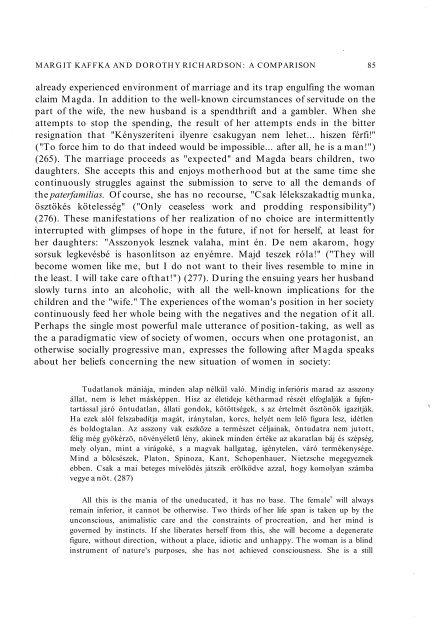84 STEVEN TÖTÖSY de ZEPETNEKthe birth of their child... Yet, the continuation of their relationship after thisincident appears to stabilize in the sense that Magda lets her aspirations andrebellion momentarily go underground. Jenő made advances professionallyand financially (the social arena) and Magda somehow manages to enjoy herlife (the personal arena), mainly by letting herself be caught up in provincialpolitics through her husband and by a total commitment to her household,both traditional parameters of a "wife's" and "mother's" existence. Nevertheless,the descriptions in the narrative that demonstrate the continuing maritaland social demands, do not diminish her innate objection and struggle againstthese demands and impositions, even if at times they retreat into the backgroundof awareness.The initially successful fortunes of Jenő in provincial politics end in tragedy.After losing an election and accumulating debts, he commits suicide. The yearsafter result in more experiences of defencelessness, now of course compoundedby the syndrome of the "widow" and the "single mother." Magda moves tothe capital and becomes disgusted with the different yet equally objectionablesocial circumstances and the obvious advances men make towards the prettywidow, the open prey. 8After a few weeks, she decides to leave this highlycharged and disagreeable urban environment and returns to her home town.Since the death of Jenő, a friend of both, Dénes Horváth, also a lawyer, showsinterest in and sensitivity for her. They have many talks which help Magda toovercome her fragile emotional state. Soon he is a suitor. The decision tomarry again does not come easy. Magda walks with open eyes and observesand absorbs much around her. The descriptions of these observations tell usas much about the people and circumstances she analyses as about herself. Inone instance, she inwardly exclaims "Ó, csak a fiatalság, csak az ne múlna elsoha... Igen, nekem még van egy kicsi, hova tegyem?" ("Oh, youth, if only itwould last forever... Yes, I still have a little of it, what should I do with it?")(235). But this serious and profound universal quality, expectation from life,will again betray her. It will betray her because of women's position in society.She has no way out but to resign to what everyone expects to be the norm.In substance, Magda's life has not changed. The three forces pulling her,sometimes all in one, more often in different directions, are her acuteawareness of her marginalized and defenceless position in society, her fear ofgrowing old and what that means for a woman, and her resulting resignationthat "úgy látszik, nem voltam küzdésre és függetlenségre alkalmas! De másrévén, egy férfi révén tudtam akarni erősen, mindig" ("it seems, I was not ableto fight and be independent! But through another, through a man I could wantstrongly, always") (259). Acting consequently with the recognition of havingno choice, she marries the supporting old friend, Dénes. And soon the old and
MARGIT KAFFKA AND DOROTHY RICHARDSON: A COMPARISON 85already experienced environment of marriage and its trap engulfing the womanclaim Magda. In addition to the well-known circumstances of servitude on thepart of the wife, the new husband is a spendthrift and a gambler. When sheattempts to stop the spending, the result of her attempts ends in the bitterresignation that "Kényszeríteni ilyenre csakugyan nem lehet... hiszen férfi!"("To force him to do that indeed would be impossible... after all, he is a man!")(265). The marriage proceeds as "expected" and Magda bears children, twodaughters. She accepts this and enjoys motherhood but at the same time shecontinuously struggles against the submission to serve to all the demands ofthe paterfamilias. Of course, she has no recourse, "Csak lélekszakadtig munka,ösztökés kötelesség" ("Only ceaseless work and prodding responsibility")(276). These manifestations of her realization of no choice are intermittentlyinterrupted with glimpses of hope in the future, if not for herself, at least forher daughters: "Asszonyok lesznek valaha, mint én. De nem akarom, hogysorsuk legkevésbé is hasonlítson az enyémre. Majd teszek róla!" ("They willbecome women like me, but I do not want to their lives resemble to mine inthe least. I will take care ofthat!") (277). During the ensuing years her husbandslowly turns into an alcoholic, with all the well-known implications for thechildren and the "wife." The experiences of the woman's position in her societycontinuously feed her whole being with the negatives and the negation of it all.Perhaps the single most powerful male utterance of position-taking, as well asthe a paradigmatic view of society of women, occurs when one protagonist, anotherwise socially progressive man, expresses the following after Magda speaksabout her beliefs concerning the new situation of women in society:Tudatlanok mániája, minden alap nélkül való. Mindig inferióris marad az asszonyállat, nem is lehet másképpen. Hisz az életideje kétharmad részét elfoglalják a fajfentartássaljáró öntudatlan, állati gondok, kötöttségek, s az értelmét ösztönök igazítják.Ha ezek alól felszabadítja magát, iránytalan, korcs, helyét nem lelő figura lesz, idétlenés boldogtalan. Az asszony vak eszköze a természet céljainak, öntudatra nem jutott,félig még gyökérző, növényéletű lény, akinek minden értéke az akaratlan báj és szépség,mely olyan, mint a virágoké, s a magvak hallgatag, igénytelen, váró termékenysége.Mind a bölcsészek, Platon, Spinoza, Kant, Schopenhauer, Nietzsche megegyeznekebben. Csak a mai beteges mívelödés játszik erőlködve azzal, hogy komolyan számbavegye a nőt. (287)All this is the mania of the uneducated, it has no base. The female 9will alwaysremain inferior, it cannot be otherwise. Two thirds of her life span is taken up by theunconscious, animalistic care and the constraints of procreation, and her mind isgoverned by instincts. If she liberates herself from this, she will become a degeneratefigure, without direction, without a place, idiotic and unhappy. The woman is a blindinstrument of nature's purposes, she has not achieved consciousness. She is a still
- Page 1 and 2:
Papers of the Radnóti Memorial Con
- Page 3:
HUNGARIAN STUDIESVOLUME 11, 1996 CO
- Page 8 and 9:
6 GEORGE GÖMÖRIprobably Fürst an
- Page 10 and 11:
8 GEORGE GÖMÖRIof the utmost impo
- Page 12 and 13:
10 GEORGE GÖMÖRIén e földön...
- Page 14 and 15:
12 GEORGE GÖMÖRINotes1. Miklós R
- Page 16 and 17:
14 MIHÁLY SZEGEDY-MASZÁKself alwa
- Page 18 and 19:
16 MIHÁLY SZEGEDY-MASZÁKtype is r
- Page 20 and 21:
18 MIHÁLY SZEGEDY-MASZÁKpose, the
- Page 22 and 23:
20 MIHÁLY SZEGEDY-MASZÁK"Wozu Dic
- Page 24 and 25:
22 MIHÁLY SZEGEDY-MASZÁKand Wilme
- Page 26 and 27:
24 MIHÁLY SZEGEDY-MASZÁKbeen the
- Page 28 and 29:
26 MIHÁLY SZEGEDY-MASZÁKBolond, k
- Page 30 and 31:
28 MIHÁLY SZEGEDY-MASZÁK6. Emery
- Page 32 and 33:
30 ZSUZSANNA OZSVÁTHand breaks as
- Page 34 and 35:
32 ZSUZSANNA OZSVÁTHThe drama echo
- Page 36: 34 ZSUZSANNA OZSVÁTHcontinents at
- Page 39 and 40: FROM CAIN TO NAHUM 37which, as Csap
- Page 41 and 42: \FROM CAIN TO NAHUM 39and bears and
- Page 43 and 44: FROM CAIN TO NAHUM 41who sees what
- Page 45 and 46: FROM CAIN TO NAHUM 438. "A félelme
- Page 47 and 48: HELP ME, PASTORAL MUSE:THE VIRGELIA
- Page 49 and 50: HELP ME, PASTORAL MUSE 47compete! W
- Page 51 and 52: HELP ME, PASTORAL MUSE 49of a priva
- Page 53 and 54: HELP ME, PASTORAL MUSE 51Once again
- Page 55 and 56: HELP ME, PASTORAL MUSE 53Eighth Ecl
- Page 57 and 58: HELP ME, PASTORAL MUSE 55have that
- Page 59: HELP ME, PASTORAL MUSE 57Paul de Ma
- Page 62 and 63: 60 SAMUEL J. WILSONWe did, however,
- Page 64 and 65: 62 SAMUEL J. WILSONbeings and contr
- Page 66 and 67: 64 SAMUEL J. WILSONHungarians would
- Page 68 and 69: 66 SAMUEL J. WILSONthe Austrians. G
- Page 70 and 71: 68 SAMUEL J. WILSONnorth-eastern Zi
- Page 72 and 73: 70 SAMUEL J. WILSONoriginally pursu
- Page 74 and 75: 72 SAMUEL J. WILSONGörgey's decisi
- Page 76 and 77: 74 SAMUEL J. WILSONfrom occurring,
- Page 78 and 79: 76 SAMUEL J. WILSON8. Artúr Görge
- Page 80 and 81: 78 STEVEN TÖTÖSY de ZEPETNEKtört
- Page 82 and 83: 80 STEVEN TÖTÖSY de ZEPETNEKThe c
- Page 84 and 85: 82 STEVEN TÖTÖSY de ZEPETNEKher u
- Page 88 and 89: 86 STEVEN TÖTÖSY de ZEPETNEKrooti
- Page 90 and 91: 88 STEVEN TÖTÖSY de ZEPETNEKcriti
- Page 92 and 93: 90 STEVEN TÖTÖSY de ZEPETNEK'My f
- Page 94 and 95: 92 STEVEN TÖTÖSY de ZEPETNEKshe d
- Page 96 and 97: 94 STEVEN TÖTÖSY de ZEPETNEKNotes
- Page 99 and 100: BERLIN ET PARIS DE LAJOS TIHANYIVAL
- Page 101 and 102: BERLIN ET PARIS DE LAJOS TIHANYI 99
- Page 103 and 104: BERLIN ET PARIS DE LAJOS TIHANYI 10
- Page 105 and 106: BERLIN ET PARIS DE LAJOS TIHANYI 10
- Page 107 and 108: BERLIN ET PARIS DE LAJOS TIHANYI 10
- Page 109 and 110: BERLIN ET PARIS DE LAJOS TIHANYI 10
- Page 111 and 112: BERLIN ET PARIS DE LAJOS TIHANYI 10
- Page 113 and 114: BERLIN ET PARIS DE LAJOS TIHANYI 11
- Page 115: BERLIN ET PARIS DE LAJOS TIHANYI 11
- Page 118 and 119: 116 KEVIN E. KELLYfilms Lugosi made
- Page 120 and 121: 118 KEVIN E. KELLYthe provinces, no
- Page 122 and 123: 120 KEVIN E. KELLYWith his brief an
- Page 124 and 125: 122 KEVIN E. KELLYboth his and Dean
- Page 126 and 127: 124 KEVIN E. KELLYfollowed it into
- Page 128 and 129: 126 KEVIN E. KELLYvampiric nobleman
- Page 130 and 131: 128 KEVIN E. KELLYThe film also boo
- Page 132 and 133: 130 KEVIN E. KELLYWood remained one
- Page 134 and 135: 132 KEVIN E. KELLYLugosi, convinced
- Page 136 and 137:
134 KEVIN E. KELLY19. Lennig, 112-1
- Page 139 and 140:
THE AGON OF IRONY AND SATIREIN GYÖ
- Page 141 and 142:
THE AGON OF IRONY AND SATIRE 139poe
- Page 143 and 144:
THE AGON OF IRONY AND SATIRE 141tra
- Page 145 and 146:
THE AGON OF IRONY AND SATIRE 143fek
- Page 147 and 148:
THE AGON OF IRONY AND SATIRE 145ner
- Page 149 and 150:
THE AGON OF IRONY AND SATIRE 147whi
- Page 151 and 152:
THE AGON OF IRONY AND SATIRE 149mov
- Page 153 and 154:
THE AGON OF IRONY AND SATIRE 151for
- Page 155 and 156:
THE AGON OF IRONY AND SATIREA harma
- Page 157 and 158:
MURDER IN THE MOUNTAINSTranslated b
- Page 159 and 160:
MURDER IN THE MOUNTAINS 157"Afraid?
- Page 161 and 162:
MURDER IN THE MOUNTAINS 159Abády,
- Page 163 and 164:
MURDER IN THE MOUNTAINS 161"The mar
- Page 165 and 166:
MURDER IN THE MOUNTAINS 163Bálint
- Page 167 and 168:
MURDER IN THE MOUNTAINS 165"That is
- Page 169 and 170:
MURDER IN THE MOUNTAINS 167at hand,
- Page 171 and 172:
CONTRIBUTORSMiklós BÁNFFYLászló
















